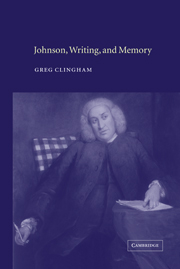Book contents
- Frontmatter
- Contents
- Acknowledgments
- List of abbreviations
- Introduction: Johnson and authority
- 1 Johnson and memory
- 2 Johnson and nature
- 3 Law, narrative, and memory
- 4 Narrative, history, and memory in the Lives of the Poets
- 5 Translation and memory in the Lives of the Poets
- 6 Historiographical implications
- Notes
- Bibliography
- Index
6 - Historiographical implications
Published online by Cambridge University Press: 22 September 2009
- Frontmatter
- Contents
- Acknowledgments
- List of abbreviations
- Introduction: Johnson and authority
- 1 Johnson and memory
- 2 Johnson and nature
- 3 Law, narrative, and memory
- 4 Narrative, history, and memory in the Lives of the Poets
- 5 Translation and memory in the Lives of the Poets
- 6 Historiographical implications
- Notes
- Bibliography
- Index
Summary
Geoffrey Hartman begins an essay on literary history by declaring that “no one has yet written a history from the point of view of the poets – from within their consciousness of the historical vocation of art.” It has been my contention in this book that this is exactly what Johnson has done in the Lives of the Poets. Not, of course, that he has written with a romantic inwardness or ideology – which are Hartman's subjects – but that, in writing about the ways poets have embodied their memories, Johnson has produced a literary history whose narrative is directly responsive to their “consciousness.” But because literary history is an open and malleable genre, and because it has usually been thought that the Lives of the Poets participates in a nationalistic enterprise of canon-formation, privileging the classical–humanist Augustan mode at the expense of other kinds of poetic language and vision, my conclusions themselves raise further questions that I wish briefly to consider here.
It is necessary to remind ourselves that the specifically historical consideration of texts – the textual criticism of the Renaissance – was intended to recover lost texts from a distant past, and to make them available to the present in scholarly acts of reconstruction. This tradition was alive in eighteenth-century England in the work of Birch, Oldys, Warburton, Bentley, Barnes, Porson, and others, including the Wartons and Johnson himself, whose Shakespeare work, for example, stands in the Renaissance tradition of textual emendation, informed by the humanist recognition that “it is vain to carry wishes beyond the condition of human things; that which must happen to all, has happened to Shakespeare, by accident and time” (Shakespeare, 1, 112).
- Type
- Chapter
- Information
- Johnson, Writing, and Memory , pp. 158 - 167Publisher: Cambridge University PressPrint publication year: 2002

